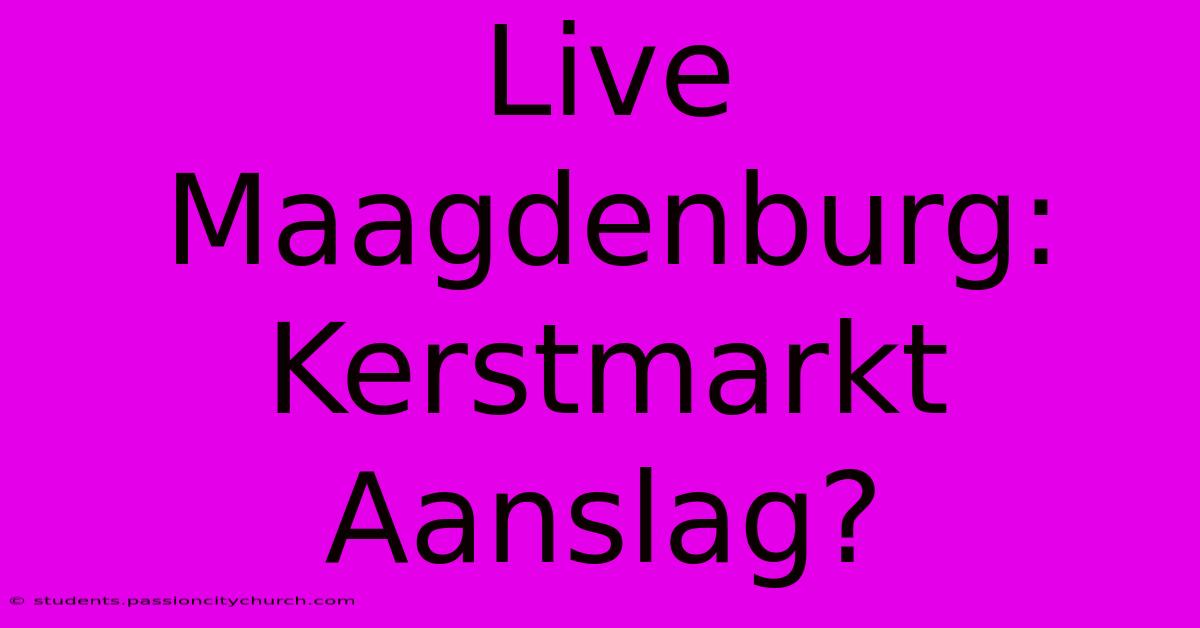Live Maagdenburg: Kerstmarkt Aanslag?

Discover more detailed and exciting information on our website. Click the link below to start your adventure: Visit Best Website. Don't miss out!
Table of Contents
Live Maagdenburg: Kerstmarkt Aanslag? Unpacking the Rumours and Reality
The festive cheer of a Christmas market can quickly turn to terror if rumours of an attack surface. The recent online chatter surrounding a potential “Live Maagdenburg: Kerstmarkt Aanslag?” (Live Magdeburg: Christmas Market Attack?) highlights the speed and potential impact of misinformation in the digital age. This article aims to unpack the rumours, explore the potential sources of such claims, and discuss the importance of responsible reporting and verifying information before sharing it.
Understanding the Rumour Mill:
The internet, while a powerful tool for communication, can also be a breeding ground for false information. The phrase "Live Maagdenburg: Kerstmarkt Aanslag?" circulating online suggests a live stream or other real-time footage documenting an attack at the Magdeburg Christmas market. Such claims, often spread through social media platforms and messaging apps, can quickly gain traction, causing widespread fear and anxiety. The speed at which such rumours can spread is amplified by the emotional response they trigger – fear and a desire to warn others.
Dissecting the Claims:
It's crucial to analyze the nature of the claims surrounding a potential "Live Maagdenburg: Kerstmarkt Aanslag." Do these claims originate from reputable news sources or official authorities? Are there any verifiable sources backing up the alleged attack? Often, rumours lack concrete evidence and rely on hearsay, speculation, or manipulated media. The lack of corroborating evidence from trusted sources is a significant red flag.
The Importance of Verification:
Before sharing any information, particularly concerning potentially serious events like terrorist attacks, it is vital to verify its authenticity. This involves checking multiple reliable news sources – reputable international and national media outlets, official government statements, and police reports. Cross-referencing information from different credible sources helps to determine the validity of the claims.
Potential Sources of Misinformation:
Several factors contribute to the spread of misinformation regarding incidents like the alleged Magdeburg Christmas market attack. These include:
-
Social Media Algorithms: Social media platforms often prioritize engagement, which can inadvertently boost the reach of sensational or fear-inducing content, even if false. The algorithms might not effectively differentiate between credible and unreliable sources.
-
Confirmation Bias: People are more likely to believe and share information that confirms their pre-existing beliefs or biases. If someone is already apprehensive about potential attacks, they might be more susceptible to believing unverified claims.
-
Lack of Media Literacy: A lack of understanding regarding critical evaluation of online information can lead to the uncritical acceptance and sharing of false news. This underscores the need for greater media literacy education.
-
Malicious Actors: Deliberately spreading false information, often to create panic or sow discord, is another worrying factor. This can be motivated by political agendas, personal vendettas, or even for the simple thrill of disrupting public order.
The Role of Responsible Media:
Reputable news organizations play a crucial role in combating misinformation. They adhere to strict journalistic standards, prioritizing fact-checking and verification before publishing any information. Their commitment to accuracy and responsible reporting helps counter the spread of false narratives.
The Psychological Impact of False Reports:
The psychological consequences of believing and spreading false reports about attacks can be significant. The constant fear of potential threats can lead to anxiety, stress, and even post-traumatic stress disorder (PTSD). Furthermore, the spread of misinformation can erode trust in institutions and create societal division.
Combating Misinformation:
To effectively combat the spread of misinformation, a multi-faceted approach is needed. This includes:
-
Promoting Media Literacy: Educating individuals on how to critically evaluate online information and identify fake news is vital.
-
Fact-Checking Initiatives: Supporting independent fact-checking organizations that actively debunk false claims.
-
Social Media Platform Responsibility: Encouraging social media platforms to implement stricter measures to identify and remove false or misleading content.
-
Governmental Role: Governments can play a role in promoting media literacy and supporting fact-checking initiatives.
Conclusion:
The rumour of a "Live Maagdenburg: Kerstmarkt Aanslag?" highlights the dangers of misinformation and the importance of responsible information sharing. Before believing or sharing any alarming news, especially those relating to public safety, it is critical to verify the information from multiple reliable sources. Promoting media literacy, supporting fact-checking initiatives, and holding social media platforms accountable are crucial steps towards combating the spread of false information and ensuring the safety and well-being of communities. Remember, responsible citizenship involves verifying information before amplifying it. The festive spirit should not be overshadowed by unsubstantiated fear.

Thank you for visiting our website wich cover about Live Maagdenburg: Kerstmarkt Aanslag?. We hope the information provided has been useful to you. Feel free to contact us if you have any questions or need further assistance. See you next time and dont miss to bookmark.
Also read the following articles
| Article Title | Date |
|---|---|
| Yellow Wind Warning Devon And Cornwall Sunday | Dec 21, 2024 |
| Zwei Tote Bei Anschlag Auf Weihnachtsmarkt | Dec 21, 2024 |
| Met Office Fiercest Winds Predicted | Dec 21, 2024 |
| Bayern Munich 5 1 Leipzig Resultado | Dec 21, 2024 |
| Liveticker Bayern Siegt 5 1 Gegen Leipzig | Dec 21, 2024 |
| Teen Cricketer Konstas In Test Squad | Dec 21, 2024 |
| Onde Assistir Bayern X Leipzig Palpites | Dec 21, 2024 |
| Dominant Bayern 5 1 Win Over Leipzig | Dec 21, 2024 |
| Stars Shock Axing Official Confirmation | Dec 21, 2024 |
| Bayern Muenchen Kantersieg Zum Jahresabschluss | Dec 21, 2024 |
